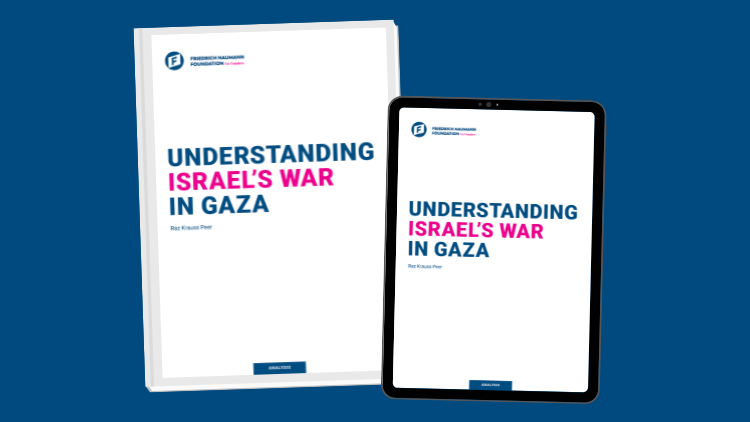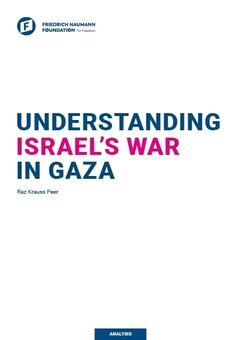Policy Paper
The Gaza war in a Nutshell

The Hamas terrorist attack on the 7th of October shook Israeli society to its core. After years of failing to negotiate peace, many Israelis settled for security. Now, with neither peace nor security, a divided and traumatized Israel faces its darkest hour. It is still too early to predict how or when the war will end, but certain steps can already be taken to improve the post-war reality.
The Hamas attack and the collapse of “security through strength”
The Israeli-Palestinian conflict, known for its complexity, has seen minimal progress despite numerous attempts of resolving it. Until the current war, many Israelis viewed a two-state solution as desirable but impractical, leading to a decline in support for peace talks. The "No Palestinian Partner for Peace" narrative, coined by former Prime Minister Barak in 2000, marked a shift in Israeli society from pursuing peace to prioritizing security. The 2005 Gaza disengagement, while initially fostering hope for peace, was followed by the rise of Hamas, further undermining the prospects of a peaceful resolution.
The brutal 7th of October attack shattered the perception of security through strength, prompting a reassessment of Israeli priorities. The attack found Israel in the middle of an internal political crisis that already started before the war - with the disbanding of the government in 2018 followed by subsequent rounds of elections, leading to Netanyahu's return to power in 2022. Despite internal divisions, Israelis rallied together, temporarily, setting aside political differences for a united front against Hamas.
Israel – united at war, divided by objectives
However, this unity is now being somewhat challenged by the two conflicting objectives of dismantling Hamas and securing the release of Israeli hostages. The dismantling of Hamas is seen by many as the bare minimum Israel needs to accomplish to remove this new existential threat. With many hostages released in the past days, Israel now faces a painful reality. Any release of hostages by Hamas will require three things: A temporary ceasefire that would allow Hamas to regroup, the delivery of fuel and other resources into the Gaza Strip, and the release of Hamas terrorists from Israeli prisons. Any one of these would extend and further complicate the Israel Defense Forces’ campaign in Gaza. This uncomfortable truth has the potential of tearing a newly united Israel apart once more, as Israel faces the consequences of a partial hostage release deal.
Many Israelis are also divided on what the government’s post-war plan for Gaza should be. Specifically, on the topic of who is going to go into the vacuum after Hamas is removed? Sceptics claim that the forceful removal of Hamas is not possible, and that a ceasefire agreement is inevitable. The Israeli leader of the Opposition, Yair Lapid stated that the Gaza Strip should be returned to the Palestinian Authority after the defeat of Hamas. Prime Minister Netanyahu, on the other hand, claims that Israel must retain security control in the Gaza Strip.
Netanyahu does not seem like an ideal leadership choice for this crisis. Not too long ago, hundreds of thousands of Israelis went to the streets because of what they described as “a threat to Israeli Democracy”. Recent polls show Netanyahu’s government has dropped far below the 60 seats needed to form a coalition. Why then, does the Israeli public agree to be led by a non-transparent government that they can’t trust? The reason is fear. Israelis believe that they don’t have a choice but to rally around Netanyahu’s flag, but only until the war ends.
International support for Israel as the key factor for the future
Today’s fear driven Israel believes it must deal with its perceived existential threats, no matter the cost. In a sense, a safer Israel could be more restrained. Meaning, International support by Israel’s allies could sooth Israeli fears and thus motivate Israel to restrain its military action in a way that no sanction can. If Israel does not feel it has its back against the wall, it would also be easier to bring Israel to the negotiation table after the war.
Alongside this support, there are of course some red lines that should be taken into consideration, but they should be carefully defined. For example, Israel must not intentionally target and kill civilians. But this also means that unintentional deaths of civilians cannot be a red line. Defeating a terrorist organization intentionally embedded within densely populated areas without civilian deaths is impossible. Thus, demanding no civilians are killed is the equivalent of setting Israel up to fail. Israel takes great care to minimize civilian casualties. It alerts residents before airstrikes, it maintains a humanitarian corridor to the south, where it allows humanitarian aid to enter the Gaza Strip. Despite all this, Israel is being heavily criticized internationally.
If every attack is a war crime, and every war is “genocide”, how is this distorted version of international humanitarian law any different from plain demonization? Expanding the definitions of what constitutes a war crime to suit a political agenda is wrong and could also be detrimental to the normative standard of international humanitarian law in the future.
The demonization of Israel will complicate the post-war reality
The demonization of Israel and the IDF by some international actors might in the end serve as a double-edged sword. After the war ends, an isolated Israel would be much more motivated to trust no one else with its security. That means seeking complete Israeli security control of the Gaza Strip. In other words, excessive international criticism of Israel might increase the likelihood of far right extremist policies and hurt any future diplomatic efforts of moderate forces.
In conclusion, the international community should support Israel’s efforts to remove Hamas from power in the Gaza Strip and not play into the hands of actors who are trying to weaponize international humanitarian law to bash Israel. But it should also demand clear answers regarding the Israeli government’s plans for the Gaza Strip in the future. A hostile international community won’t stop Israel’s war in Gaza, but a friendly international community could positively influence any future agreement.
Read the full analysis in our new publication “Understanding Israel’s War in Gaza”.

